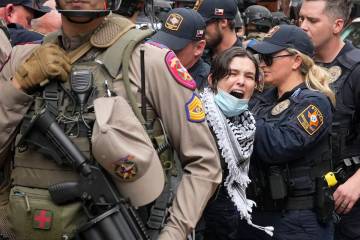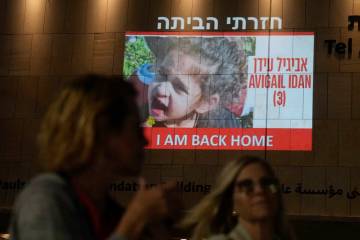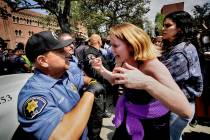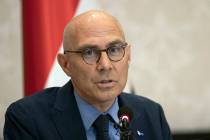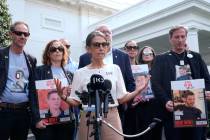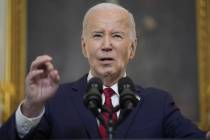Pandemic alert level raised
MEXICO CITY -- The swine flu outbreak entered a dangerous new phase Monday as the death toll climbed in Mexico and the number of cases there and in the United States nearly doubled. The World Health Organization raised its alert level but stopped short of declaring a global emergency.
The United States advised Americans against most travel to Mexico and ordered stepped-up border checks in neighboring states. The European Union health commissioner advised Europeans to avoid nonessential travel both to Mexico and parts of the United States.
The virus poses a new threat to the U.S. economy, which was showing tentative early signs of a recovery. A widespread outbreak could batter tourism, food and transportation industries, deepening the recession in the United States and possibly worldwide.
The number of deaths rose to 152 in Mexico, the epicenter of the outbreak with nearly 2,000 people who might be infected.
The number of U.S. cases rose to 50, the result of further testing at a New York school, although none was fatal. Other U.S. cases have been reported in Ohio, Kansas, Texas and California. Worldwide there were 79 confirmed cases, including six in Canada, one in Spain and two in Scotland.
WHO reported a slightly lower figure, 73. The agency said it still awaited official reports from Britain about the Scottish cases. Different numbers were reported in the United States (40) and Mexico (26) from what those governments confirmed.
While the total cases were still measured in hundreds, not thousands, Mexican Health Secretary Jose Angel Cordova said the epidemic was entering an extremely dangerous phase, with the number of people infected mushrooming even as authorities desperately ramped up defenses.
"We are in the most critical moment," Cordova said. "The number of cases will keep rising, so we have to reinforce preventative measures."
WHO raised the alert level to Phase 4, meaning there is sustained human-to-human transmission of the virus causing outbreaks in at least one country.
Its alert system was revised after bird flu in Asia began to spread in 2004, and Monday was the first time it was raised above Phase 3.
"At this time, containment is not a feasible option," as the virus has already spread to several other countries, said WHO Assistant Director-General Keiji Fukuda.
Putting an alert at Phases 4 or 5 signals that the virus is becoming increasingly adept at spreading among humans. That move could lead governments to set trade, travel and other restrictions aimed at limiting its spread.
Phase 6 is for a full-blown pandemic, characterized by outbreaks in at least two regions of the world.
It could take 4-6 months before the first batch of vaccines are available to fight the virus, WHO officials said.
Russia, Hong Kong and Taiwan said they would quarantine visitors showing symptoms of the virus amid global fears of a pandemic, an epidemic spread over a large area, either a region or worldwide.
President Barack Obama said the outbreak was reason for concern but not yet "a cause for alarm."
Dr. Richard Besser, acting chief of the Centers for Disease Control and Prevention, said that so far the virus in the United States seems less severe than in Mexico. Only one person has been hospitalized.
"I wouldn't be overly reassured by that," Besser said, raising the possibility of more severe U.S. cases.
"We are taking it seriously and acting aggressively," Besser said. "Until the outbreak has progressed, you really don't know what it's going to do."
U.S. customs officials began checking people entering U.S. territory. Millions of doses of flu-fighting medications from a federal stockpile were on their way to states, with priority given to the five already affected and to border states. Federal agencies were conferring with state and international governments.
"We want to make sure that we have equipment where it needs to be, people where they need to be and, most important, information shared at all levels," said Janet Napolitano, head of the Homeland Security Department.
She said travel warnings for trips to Mexico would remain in place as long as swine flu is detected.
Mexico canceled school at all levels nationwide until Monday, and the Mexico City government said it was considering a complete shutdown, including all public transportation, if the death toll keeps rising. Labor Secretary Javier Lozano Alarcon said employers should isolate anyone showing up for work with fever, cough, sore throat or other signs of the flu.
Even some of Mexico's most treasured national holidays were affected by the swine flu alert. Authorities announced Monday the cancellation of the annual Cinco de Mayo parade, in which people in period costumes celebrate Mexican troops' defeat of a French army on May 5, 1862. The national labor umbrella group announced the cancellation of Mexico City's traditional May 1 parade and the National Institute of Anthropology and History said all of its 116 museums nationwide would be closed until further notice.
Amid the warnings, the Mexican government grappled with increasing criticism of its response. At least two weeks after the first swine flu case, the government has yet to say where and how the outbreak began or give details on the victims.
Aside from the confirmed cases, 13 are suspected in New Zealand, and one is suspected in both France and Israel.
European Union Health Commissioner Androulla Vassiliou advised Europeans to avoid nonessential travel to Mexico and parts of the United States. Including the U.S. in the advisory seemed unwarranted at this time, Besser said.
State Department spokesman Robert Wood said Vassiliou's remarks were his "personal opinion," not an official EU position, and therefore the department had no comment.
U.S. officials stepped up checks of people entering the country by air, land and sea, and the State Department warned U.S. citizens to avoid nonessential travel to Mexico. It said those who live in Mexico should avoid hospitals or clinics there unless they have a medical emergency.
The best way to keep the disease from spreading, Besser said, is by taking everyday precautions such as frequent handwashing, covering up coughs and sneezes, and staying away from work or school if not feeling well. Authorities are not recommending that people wear masks at work because evidence that it is effective "is not that strong."
Besser said about 11 million doses of flu-fighting drugs from a federal stockpile have been sent to states in case they are needed. That's roughly one quarter of the doses in the stockpile, he said.
There is no vaccine available to prevent the specific strain now being seen, he said, but some antiflu drugs do work once someone is sick.
If a new vaccine eventually is ordered, the CDC already has taken a key preliminary step, creating what's called seed stock of the virus that manufacturers would use.






